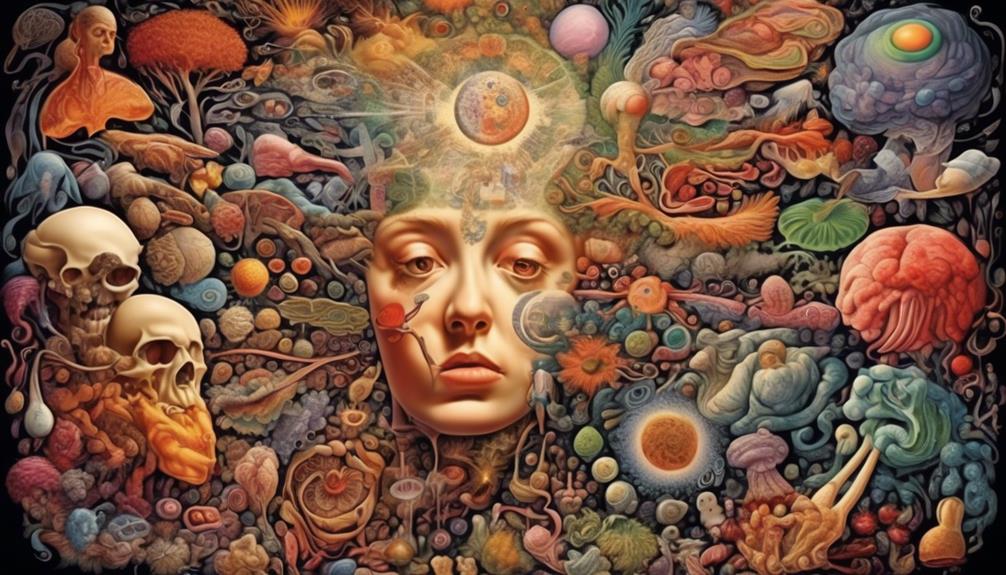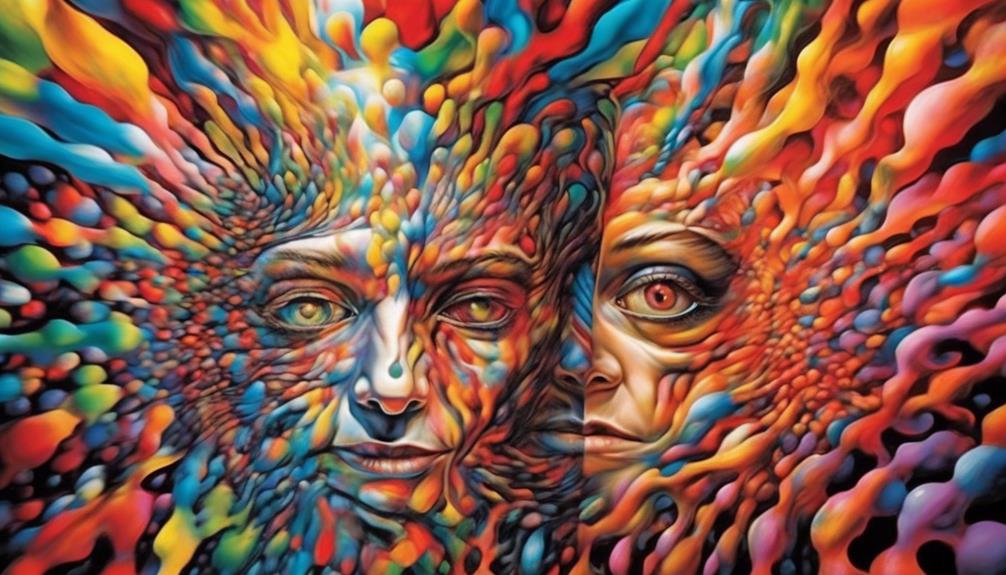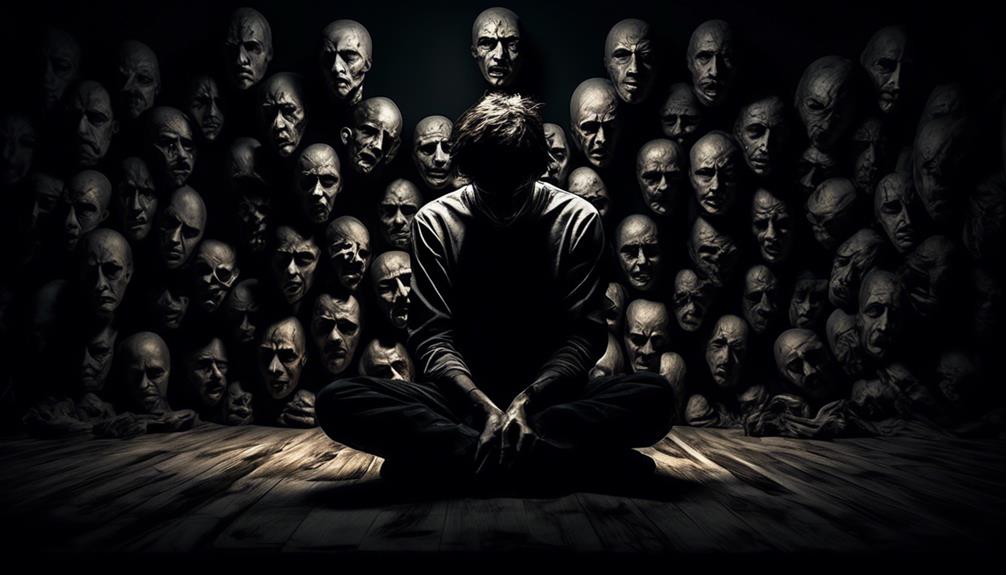Have you ever found yourself intrigued by the fine line that distinguishes hallucinations from delusions? This subject often sparks our curiosity and prompts us to ponder the complex workings of the human mind.
As we navigate the intricate landscape of psychosis, distinguishing between these two phenomena becomes crucial for understanding the complexities of various mental health conditions.
Let's explore the subtle yet significant disparities that set hallucinations and delusions apart, shedding light on their unique characteristics and implications in the realm of mental health.
Key Takeaways
- Hallucinations involve sensory misperceptions, while delusions are false beliefs.
- Hallucinations can impact any of the five senses, while delusions primarily revolve around ideas.
- Recognizing the differences between hallucinations and delusions is crucial for accurate diagnosis.
- Comprehensive treatment plans for hallucinations and delusions often include therapy and medication.
Definitions and Characteristics
What distinguishes delusions from hallucinations in terms of their definitions and characteristics?
Delusions are false beliefs that persist despite evidence to the contrary. They're often symptoms of mental health conditions such as schizophrenia or bipolar disorder. These beliefs can be categorized as non-bizarre, involving situations that could happen in real life, or bizarre, which are highly implausible or impossible.
On the other hand, hallucinations involve sensory misperceptions, such as seeing, hearing, or feeling something that isn't actually there. Hallucinations can impact any of the five senses and may be experienced in various forms. While delusions primarily revolve around false beliefs, hallucinations are more centered on false sensory experiences.
It's crucial to differentiate between the two as they can stem from different underlying causes, including mental health conditions, physical illnesses, or substance abuse. Understanding these distinctions is vital for accurately diagnosing and treating individuals experiencing these symptoms.
Types of Hallucinations

Hallucinations can be classified into various types based on the sensory modalities they affect and the nature of the perceived stimuli. The types of hallucinations include auditory, visual, olfactory, gustatory, and tactile hallucinations. Auditory hallucinations involve hearing voices or sounds that aren't present, while visual hallucinations entail seeing things that others do not. Olfactory hallucinations involve smelling odors that aren't there, gustatory hallucinations relate to experiencing tastes without a stimulus, and tactile hallucinations involve feeling nonexistent physical sensations on the skin.
Understanding the difference between hallucinations and delusions is crucial in diagnosing and treating individuals experiencing a psychotic episode. Delusions are false beliefs that are firmly held despite evidence to the contrary. Types of delusions include persecutory delusions, where individuals believe they're being targeted, and somatic delusions, where there's a preoccupation with health issues.
Treatment of delusions often involves a combination of therapy and medication to address underlying mental health conditions.
Types of Delusions
Different types of delusions are characterized by specific themes that shape individuals' false beliefs. Delusions are fixed, false beliefs that aren't based on reality but are strongly held despite evidence to the contrary.
In the realm of medical or mental health, identifying the types of delusions is crucial for understanding and addressing underlying mental illness effectively.
One common type of delusion is persecutory delusions, where individuals believe they're being threatened, harassed, or conspired against.
Grandiose delusions involve exaggerated beliefs about one's importance, power, knowledge, or identity.
Referential delusions lead individuals to believe that random events or gestures are specifically targeted at them.
Somatic delusions involve false beliefs about one's body, health, or bodily functions.
On the other hand, erotomanic delusions involve the false belief that someone, usually of higher social standing, is in love with them.
These specific types of delusions often require targeted therapeutic interventions, such as cognitive behavioral therapy (CBT), to help individuals challenge and modify these false beliefs.
Variances in Perception

In the realm of mental health, variations in perception play a crucial role in understanding individuals' experiences and symptoms. When considering hallucinations and delusions, these perceptual differences are key in distinguishing between the two phenomena.
- Common Types of Hallucinations: Hallucinations can manifest in various forms, such as auditory (hearing voices), visual (seeing things), olfactory (smelling odors), gustatory (tasting flavors), and tactile (feeling sensations). These sensory experiences may seem incredibly real to the person experiencing them, despite lacking any external stimuli.
- Delusion as a False Belief: On the other hand, a delusion is a false belief that's maintained despite evidence to the contrary. Unlike hallucinations that involve sensory experiences, delusions often revolve around ideas, thoughts, or beliefs that aren't grounded in reality but are perceived as real to the individual.
- Perception through the Eyes of a Mental Health Professional: From the perspective of a mental health professional, understanding these variances in perception is crucial for accurate diagnosis and effective treatment. By recognizing the differences between hallucinations and delusions, clinicians can provide targeted interventions to support individuals experiencing these symptoms.
Treatment Approaches
When addressing treatment approaches for individuals experiencing hallucinations and delusions, a comprehensive plan that integrates cognitive-behavioral therapy (CBT) and medication is often implemented.
Delusions, which can be associated with conditions like Alzheimer's disease or Bipolar Disorder, require tailored medical interventions.
In contrast, hallucinations tied to mental illnesses or physical conditions such as Parkinson's disease are commonly managed with medication as a primary approach.
The presence of substance abuse-related delusions and hallucinations necessitates evaluation by medical professionals skilled in mental health and addiction treatment. Baton Rouge Behavioral Hospital in Louisiana offers specialized treatment programs designed to stabilize patients grappling with these symptoms of psychosis.
Effective treatment and management of hallucinations and delusions entail a multidisciplinary approach encompassing medication, therapy, and lifestyle adjustments.
Frequently Asked Questions
What Is an Example of a Delusion?
When considering an example of a delusion, it's important to note the diverse manifestations they can take.
Delusions can range from persecutory beliefs, where one feels targeted or spied upon, to grandiose delusions, where an individual holds an inflated sense of importance.
Jealous delusions, somatic delusions, and even bizarre delusions, like those involving aliens, all exemplify the varied nature of delusional thinking.
These examples highlight the complexity and diversity of delusional beliefs.
What Is an Example of a Hallucination?
When it comes to hallucinations, an example is hearing voices or seeing things that aren't there. These experiences can be vivid and unsettling. Our senses can deceive us, making us perceive things that aren't real.
It's crucial to differentiate between what's truly happening and what our minds may be fabricating. Hallucinations can be challenging to cope with, and seeking professional help is important for proper evaluation and management.
Can You Hallucinate Without Delusions?
Yes, we can hallucinate without experiencing delusions. Hallucinations are sensory distortions where individuals see, hear, or feel things that aren't present, while delusions are false beliefs.
Hallucinations can manifest independently or coexist with delusions. Understanding these distinctions is crucial in diagnosing and treating mental health conditions effectively.
Seek professional guidance if you or a loved one experiences hallucinations or delusions for proper evaluation and care.
Do Delusions or Hallucinations Come First?
When considering the sequence of delusions and hallucinations, it's essential to acknowledge the variability in presentation.
In some cases, delusions may manifest before hallucinations, indicating a cognitive shift in belief systems.
Conversely, hallucinations preceding delusions can suggest alterations in sensory perception influencing subsequent thought processes.
This temporal relationship between delusions and hallucinations highlights the intricate interplay between cognitive and perceptual disturbances, necessitating comprehensive evaluation for appropriate interventions.
Conclusion
In summary, the distinction between hallucinations and delusions lies in the realm of perception and belief.
While hallucinations involve sensory misperceptions, delusions are false beliefs that persist despite evidence to the contrary.
Understanding these differences is crucial in the diagnosis and treatment of individuals experiencing psychosis.
By addressing these symptoms through a combination of medication and therapy, individuals can work towards managing their condition and improving their quality of life.









